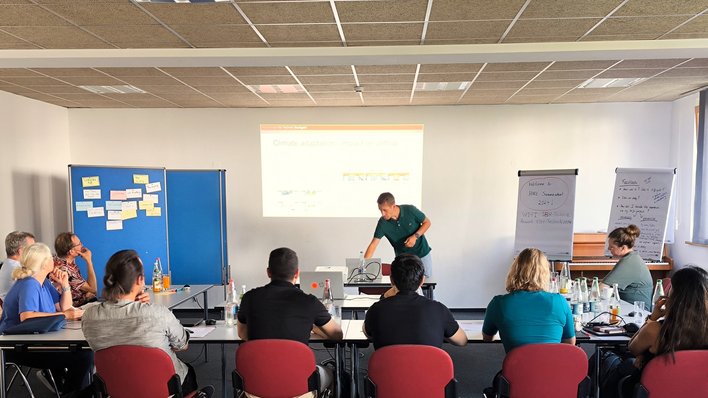Based alignment for outdoor Mixed Reality applications within the context of BIM and Digital Twins
Can mixed reality support the creation of digital twins in the process of communication between real and digital models? And not just be a means of visualisation?
![[Image: HFT Stuttgart] Promovierende der HFT Stuttgart](/fileadmin/Dateien/Forschung/_processed_/6/d/csm_Bild_PHD_Flyer_1a393196aa.png)
![[Image: HFT Stuttgart] Mitarbeitende der HFT Stuttgart](/fileadmin/Dateien/Forschung/_processed_/a/c/csm_hft_0925-53_1a809bf876.jpg)
![[Image: HFT Stuttgart] HFT Summer School 2025](/fileadmin/Dateien/Forschung/_processed_/4/0/csm_IMG_20250721_151714_d4a27a61bb.jpg)
![[Image: HFT Stuttgart] HFT Summer School 2024, Project HIRE](/fileadmin/Dateien/Forschung/_processed_/0/1/csm_IMG-20240807-WA0021_f2fe3d661b.jpg)
![[Image: HFT Stuttgart] Tag der Forschung: doctoral candidates](/fileadmin/Dateien/Forschung/_processed_/b/7/csm_Image20250805140906_ce676ae0f3.jpg)
![[Image: HFT Stuttgart] HFT Summer school 2025](/fileadmin/Dateien/Forschung/_processed_/e/5/csm_IMG_20250722_172830_1__f56cd841c1.jpg)
![[Image: HFT Stuttgart] Mitarbeiter nimmt Probandin die VR-Brille ab](/fileadmin/Dateien/Hochschule/_processed_/e/d/csm_hft_31224-116_0698875304.jpg)
![[Image: Juan Sardi] Forschungsprojekt](/fileadmin/Dateien/Forschung/Promotion/d3590899-3901-4025-881e-13bcf8e9f2fd-ezgif.com-reverse.gif)
![pic_Hybrid_Participation_Formats_for_Urban_Resilience [Image: Amando Reber, HFT] Hybrid Participation Formats for Urban Resilience](/fileadmin/Dateien/Forschung/_processed_/b/e/csm_02_Intervention_1__7015aed0f6.jpg)
![[Image: HFT Stuttgart] Heat exchange in urban canyon](/fileadmin/Dateien/Forschung/_processed_/b/3/csm_Image20250807120505_a55c8d2b7a.jpg)
![[Image: HFT Stuttgart] Hand zeigt auf Karte mit Stecknadeln](/fileadmin/Dateien/Forschung/_processed_/3/6/csm_IMGL3283_031b875d36.jpg)
![[Image: Michaela Marxt] Promovierende bei Hörversuchen in der Stadt](/fileadmin/Dateien/Forschung/_processed_/a/c/csm_20241011_134940-1_a33b5069f6.jpg)
![[Image: Dr. Svetlana Valger, HFT Stuttgart] Benjamin Hueber, Doktorand an der HFT Stuttgart, präsentiert sein Poster mit dem Titel „Development and Numerical Analysis of Active Bottom Surface Cooling (ABSC) for Urban Heat Mitigation and Thermal Comfort Enhancement“, das auf der ICUC12 ausgezeichnet wurde.](/fileadmin/Dateien/Forschung/_processed_/b/c/csm_Poster_presentation_ICUC12_HFT_Doktorand_26f4da604c.jpg)
![[Image: Juan Sardi Barzallo, HFT Stuttgart] Juan Sardi Barzallo erhält Best Poster Award beim 2025 International Symposium on Resilience in Urban Environments.](/fileadmin/Dateien/Forschung/_processed_/d/e/csm_Int_Anerkennung_PosterAward_HFT-Doktorand_dd5918cab3.jpg)

![[Image: HFT Stuttgart] Windräder](/fileadmin/Dateien/Forschung/_processed_/1/b/csm_windy_cities_af319fb2a8.png)
![[Image: Jürgen Pollak / Clarissa Werner] Perspektive des Entwurfs der Aufstockung](/fileadmin/Dateien/Forschung/_processed_/a/0/csm_coLLab-Perspektive-Aufstockung-Entwurf_99ea2cf780.jpg)
![[Image: HFT Stuttgart] Bild dynamische Stadt](/fileadmin/Dateien/Forschung/_processed_/f/8/csm_smart_cities_987a487af2.png)